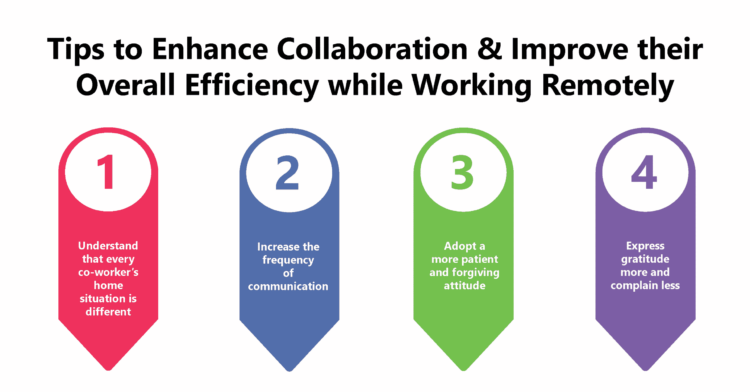1. Empathy Enhances Remote Collaboration: Understanding each co-worker’s unique situation, such as balancing personal responsibilities or facing isolation, fosters empathy and strengthens team collaboration
2. Frequent Communication is Key: Increasing the frequency of communication helps employees understand each other’s challenges, seek support, and build stronger connections.
3. Adopt Patience and Forgiveness: Being patient and forgiving toward mistakes caused by stress and anxiety promotes a supportive and cohesive team environment.
4. Express Gratitude, Not Complaints: Appreciating each other’s contributions instead of complaining encourages positivity and reinforces a sense of teamwork and mutual trust.
Organizations continue to struggle with the challenges of collaboration among remote workers and motivating them to work as a cohesive team. In this scenario, empathy among remote co-workers is the need of the hour!

COVID-19 has upended traditional office culture, ushering in an era where remote work has become the norm.
However, even as organizations struggle with this new routine, they are also facing the challenge of collaboration among co-workers.
Unlike traditional workspaces, co-workers in co-working spaces often sit together, engage in casual conversations during breaks, and share ideas and information in person.

Work from Home has forced employees to operate in near isolation, connected only through digital means.
In such a situation, they can develop a sense of mistrust and form incorrect opinions about their remote working colleagues.
It often results in overcommitments and misjudgments, which in turn affect the overall effectiveness and morale of the team.
Collaborating remotely with coworkers is challenging, especially during the current crisis.
However, it is possible to overcome this challenge by ensuring higher empathy among remote co-workers.
In this context, the following ideas might help them enhance collaboration and improve their overall efficiency while working remotely:


Employees need to understand that the home situation of each of their co-workers is different.
Some might try to continue their children’s education or care for their elderly parents.
Most employees must handle additional household responsibilities as schools and colleges close and household help is unavailable.
Some employees might be living in complete isolation, cut off from their families, which might increase their stress levels.
Hence, employees should understand what their colleagues are going through and support them in any way possible.

To understand what their co-workers are going through, employees need to communicate with each other more frequently.
Hence, co-workers need to interact with each other using any mode they feel comfortable with and even seek advice and support from each other.

Most employees working from home can become highly anxious and stressed, mainly due to the prevailing circumstances.
They may miss deadlines or make mistakes that are typically not expected of them.
Rather than making them feel guilty and embarrassed, they must adopt a more forgiving and patient attitude.
Discussing with them or rectifying the mistakes are ways to improve team spirit in these difficult times.

Additionally, employees should cultivate an attitude of gratitude for even the smallest contributions made by their coworkers.
Hence, they need to acknowledge that their combined efforts are what is helping them to fulfill their commitments to their clients.
So, rather than complaining about their peers, employees should thank them for their contribution and hard work.
The COVID-19 pandemic is a time to restore human values in professional relationships and enable co-workers to strengthen their sense of mutual trust and understanding. Empathy among remote co-workers is the need of the hour!

Lead author: Sagar Chaudhuri, the Co-Founder and CEO of HiFives. He is an HR Tech Evangelist with over 25 years of experience in both corporate and entrepreneurial settings. Previously, Sagar has held leadership roles with companies such as Genpact, Infosys, and ICICI Bank. He has an engineering degree from IIT Kharagpur and an MBA from IIM Lucknow. Connect on LinkedIn
To stay updated on the latest HiFives blogs, follow us on Twitter (@MyHiFives)